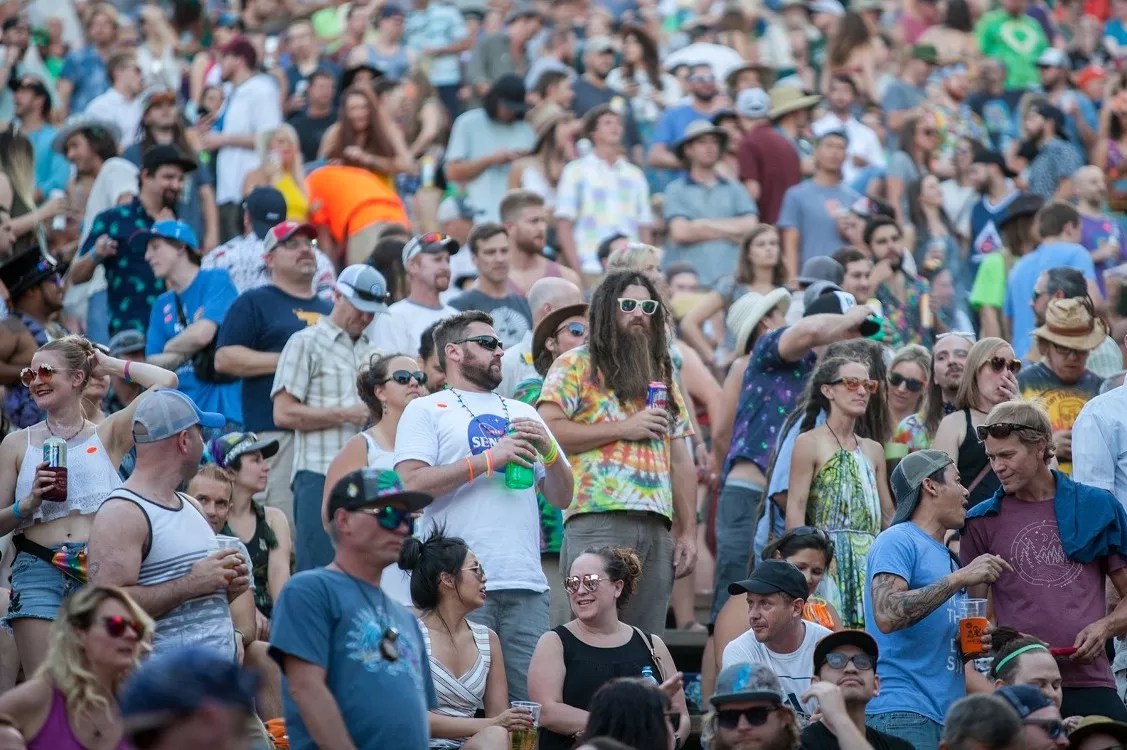
Jacqueline Collins

Audio By Carbonatix
A push toward requiring major sports and entertainment venues to create sober seating sections has been blocked in the Colorado Legislature.
If lawmakers had approved Senate Bill 23-171, arenas and stadiums such as Ball Arena, Coors Field, Folsom Field, Red Rocks Amphitheatre and other entertainment venues that seat 7,000 or more people would have been forced to explicitly ban alcohol, tobacco, marijuana and other substances in 4 percent of all seating areas by 2027 or risk losing their liquor licenses.
The proposal did “not represent a constraint on concert or sporting venues,” according to Senator Kevin Priola, who introduced the bill. “Instead, it opens them up to the sober community in a way that destigmatizes the choice not to drink or partake in other substances,” he told the Senate Finance Committee on March 28.
A proponent of substance-free lifestyles, Priola argued that sober living is on the rise among younger generations. If passed, his bill would have been the first piece of legislation in the country mandating sober seating sections, while fostering “a cultural shift toward a normalization of Coloradans’ choice not to partake” in drugs or alcohol, he told committee members.
The proposal was supported by Mental Health Colorado, Illuminate Colorado and Sober AF Entertainment, and more than a dozen addiction specialists and people with personal stories connected to substance abuse testified in support of the measure. According to Colorado Artists in Recovery director Darren Valdez, having areas devoid of alcohol allows recovering addicts to take part in fun, social events without being put in situations that could promote relapse.
“I was terrified to go to large events because the atmosphere can often be focused around drinks and substance abuse. I had to work so hard to get sober,” Valdez told the Senate committee of his journey toward sobriety.
Although Valdez said he can now attend events where alcohol is available, going to sporting events used to give him crippling anxiety – but staying home all the time prevented him from enjoying life, which was a challenge to recovery as well.
“I was filled with the fear of losing all I had built. I chose to stay away from anything that would put my sobriety in danger,” he told the committee. “But if I’m honest, being seated near intoxicated people at events is one of the most uncomfortable situations a person in recovery can face.”
The legislation would have impacted thirteen venues across Colorado: Ball Arena, Canvas Stadium, Coors Field, the Denver Coliseum, Dick’s Sporting Goods Park, Empower Field at Mile High, Fiddler’s Green Amphitheatre, Folsom Field, Falcon Stadium, Levitt Pavilion, Red Rocks Amphitheatre, Southwest Motors Event Center and the Broadmoor World Arena. Ownership groups of several of those facilities and professional sports teams using them, including the Colorado Avalanche, Colorado Rockies, Denver Nuggets and City and County of Denver, opposed the measure, according to the Colorado Secretary of State’s Office.
None of Colorado’s professional sports ownership groups testified against SB 171, nor did they respond to Westword‘s requests for comment – except for the Denver Broncos, which declined to comment and didn’t take an official position on the bill. However, Priola mentioned “offline conversations” several times throughout the hearing, and said that the majority of Colorado’s major sports and entertainment players didn’t respond to official inquiries from his office.
The Colorado Municipal League said it applauded the effort but opposed the bill because of the work and resources that would have been required from local governments, some of which own or operate the affected venues, according to policy representative Mollie Steinemann.
Ultimately, the committee voted 5 to 2 against the proposal. The majority of those who voted no said they were concerned about forcing venues to disallow certain items at seats, rather than allowing venue owners to implement such sections on their own.
“I’m not crazy about the idea of mandating this, but I’m very grateful that you’re bringing the conversation forward,” Senator Jim Smallwood told Priola. “I have had horrible experiences at almost every major sporting venue in the Denver metro area, so much so that I quit taking my kids.”
Some venues around the country have already set up substance-free areas. Coors Field, for example, has established section 342 as a designated family section, with no alcohol allowed. And approximately fourteen stadiums in the NFL have set up substance-free sections, according to Priola. However, many of these substance-free sections in NFL stadiums aren’t seats at all, but concourse tables or meeting hallways, according to groups like Sober AF.
SB 171’s 4 percent requirement called for the sober seats to be dispersed throughout the venue so that multiple viewpoints were available. Sections would have been marked with yellow signage, and venue staffers would have been tasked with enforcing the rules, with punishment up to the venue and no criminal penalty attached.
Smallwood said he hoped to see more sober seating sections at Broncos games and other events, but that the almighty dollar might be a more effective route toward creating them than legislation.
“I might be able to pay a little bit more if someone’s worried about losing revenue,” he said. “I would really hope that the folks listening would make changes on their own.”